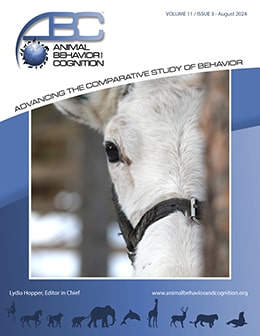Vol 11, Issue 3, August 2024
Horses Look Longer at Skilled Humans than Unskilled Ones Despite Similar Outcomes in an Object Manipulation Task
Citation
Sugimoto, T., & Hirata, S. (2024). Horses look longer at skilled humans than unskilled ones despite similar outcomes in an object manipulation task. Animal Behavior and Cognition, 11(3), 236-251. https://doi.org/10.26451/abc.11.03.01.2024
Abstract
Evaluating others based on skillfulness and prosociality is an important ability in choosing a cooperative partner. Such abilities have been studied in nonhuman species such as primates and dogs; however, few studies have examined whether horses could evaluate humans based on their skillfulness. Here, we investigated whether horses (Equus caballus) could evaluate humans based on their skillfulness in a situation related to their own interests (food). We showed horses a pair of experimenters, one that could open the lid of a container (skilled actor) and another that could not open the lid of the container (unskilled actor). The unskilled actor ‘accidentally’ dropped the container during the demonstration phase, causing the lid to open, allowing him to remove the object and thus achieve the same outcome as the skilled actor. The experimental trials involved two conditions, one in which the container had food inside, and one in which it was empty. This was because we thought the horses would have an expectation that the skilled actor would give them food after opening the container, so we predicted that horses would look longer at the skilled actor than the unskilled actor only in the food condition. We measured the gaze duration of horses toward each experimenter. Horses looked longer at the skilled actor overall and looked at the two actors longer in the food condition than in the non-food condition, and there was no interaction between role and condition. Post-hoc tests showed that the horses looked at the skilled actor longer than the unskilled actor in both conditions. They also looked at the skilled actor for longer in the food condition compared with the no-food condition. These results suggest that the horses were able to visually discriminate between humans based on their skillfulness.
Keywords
Horses, Social evaluation, Third-party evaluation, Social cognition, Horse-human relationships, Skillfulness
